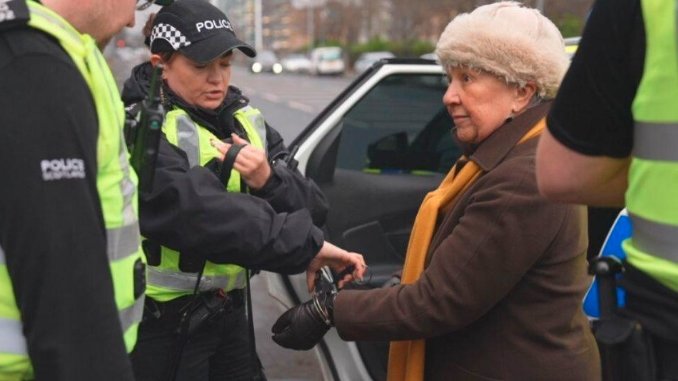A 74-year-old woman has become the first person arrested under Scotland’s controversial abortion buffer zone law. The arrest, which took place outside Queen Elizabeth Hospital in Glasgow, has sparked fresh debate over free speech and protest rights, drawing international attention and criticism.
Arrest Outside Queen Elizabeth Hospital
Glasgow police detained Rose Docherty on Wednesday for allegedly violating the recently enacted buffer zone law. A video posted by the Scottish Family Party showed Docherty standing outside the hospital, holding a sign that read: “Coercion is a crime, here to talk, only if you want.”
Officers reportedly informed Docherty that she was in breach of the law and offered her the chance to leave. When she refused, she was taken away in handcuffs. The footage has since circulated widely, with some calling her arrest an overreach, while others defend the necessity of buffer zones to protect women seeking medical care.

What Does Scotland’s Buffer Zone Law Say?
The buffer zone law, passed in July 2023, prohibits any attempt to influence a woman’s decision about abortion within approximately 600 feet of a designated facility. The legislation aims to prevent harassment and intimidation of individuals accessing reproductive healthcare services.
The law broadly defines prohibited activities, including:
- Protests or demonstrations, whether silent or vocal.
- Preaching or offering religious counsel.
- Silent vigils.
- Holding up signs or distributing pamphlets.
Critics argue that the language of the law is too vague and may be used to suppress legitimate expressions of opinion. Proponents, however, insist that it is a necessary step to protect vulnerable individuals from undue pressure.
International Reaction and Free Speech Concerns
The arrest has caught the attention of international leaders, including U.S. Vice President J.D. Vance, who recently condemned Scotland’s buffer zone law at the Munich Security Conference. Vance described the restrictions as an “egregious violation of free speech,” criticizing the Scottish government for allegedly criminalizing private prayer and peaceful expression.
The Scottish Green Party, which introduced the legislation, pushed back against Vance’s remarks. A party spokeswoman stated on Thursday that Vance misrepresented the law, insisting that it does not extend to private prayer within homes. She also noted a recent increase in pro-life demonstrations outside Queen Elizabeth Hospital following Vance’s comments.
Legal and Public Debate Intensifies
Docherty’s arrest is expected to fuel further legal and political debate. Some legal experts argue that enforcement of the law raises complex questions about the balance between free speech and the right to access healthcare without interference.
Key points of contention include:
- Intent vs. impact: Some argue that Docherty’s sign was not explicitly anti-abortion but rather a statement against coercion.
- Selective enforcement: Opponents worry that the law could be disproportionately applied to certain viewpoints.
- Judicial review: There is speculation that the case could lead to a legal challenge on human rights grounds.
What Happens Next?
Scottish authorities have not yet confirmed whether Docherty will face prosecution. If found guilty, penalties could include fines or other legal consequences.
As the debate unfolds, both pro-choice and pro-life advocates are watching closely. The case could set a precedent for how Scotland enforces its buffer zone law moving forward, with implications for similar laws in other countries.


















